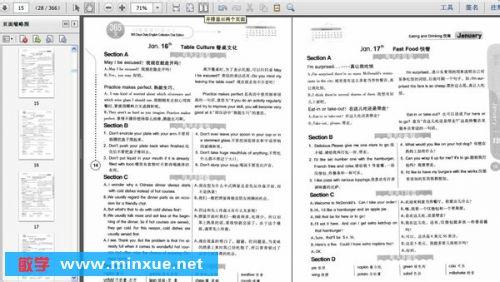拒绝总是一件让人失望的事情,但是如果你拒绝得委婉一点,再解释一下,对方就可以通情达理地接受你的选择了。
1.惯用口语句子:
I'd love to, but I can't.
我很想去,但我不能。
I'm afraid I can't.
我恐怕不行。
I'm not sure about it. I'll have to check.
我不太清楚。我看一下吧。
check v. 检查,核对
Thanks, but unfortunately I already have plans.
谢谢,但不巧的是我已经有计划了。
I'd love to, but I've got an exam that afternoon.
我很愿意,但我那天下午有个考试。
unfortunately ad. 不幸的是,不巧的是
I wish I could, but I'll have a conference that day.
我希望我能去,但我那天还有个会议。
conference n.会议,讨论会,协商会
It's very kind of you, but I have an appointment on Friday.
你真好,但我周五有个约会。
You are so nice, but I can't cancel that appointment.
你真好,但我没法取消那个约会。
appointment n. 约会,预约
I've already promised to meet Jennifer this evening, but thank you all the same.
我已经答应今晚去见詹妮弗了,不过还是要谢谢你。
all the same“还是,仍然”
Thank you very much for asking me, but I feel rather tired.
谢谢你邀请我,不过我实在是太累了。
rather ad.相当,非常
Much as I should like to, I'm afraid I won't be free next Sunday.
虽然我很想去,但恐怕下星期天我没空。
本句将“much”提前,置于句首,起强调作用。
I'll be busy all day long.
我一整天都会很忙。
I can't spare a minute.
我一分钟的时间都抽不出来。
all day long“整天”
I have to work overtime.
我得加班。
I'm working overtime.
我正在加班。
overtime ad. 加班
2.实用对话
Refusing an Invitation拒绝邀请
Joe: Jane, I was wondering if you had any plans for Saturday afternoon.
乔:简,我想知道你周六下午是否有什么打算。
Jane: A friend and I are planning to go out. Why? What's up?
简:我和我的一位朋友准备外出。怎么了?有什么事吗?
Joe: There's a special exhibition of French sculptures at the museum. I was hoping you'd like to come with me.
乔:博物馆有一个法国雕塑的特别展览。我本希望你能和我一起去。
Jane: I'm afraid I can't. I'm going to be out all day.
简:我恐怕不行。我得外出一天呢。
Joe: What about Sunday?
乔:那么周日怎么样?
Jane: I wish I could, but it's my mom's birthday.
简:我倒是希望我能去,不过那天是我妈妈的生日。
Joe: Maybe next week?
乔:也许下周可以?
Jane: Much as I'd like to. I'm afraid I won't be free next week. I have a lot of work.
简:尽管我很想去,但恐怕下周我没空。我有很多工作要做。
Joe: Sorry to hear that. I was really looking forward to spending some more time with you. I really enjoyed our last chat.
乔:听你这么说真是太遗憾了。我真希望能和你多呆会儿。我们上次聊得很愉快。
Jane: I'm really sorry, too. Maybe I can give you a call sometime.
简:我也感到非常遗憾。也许我可以找个时间给你打电话。
3.详细解说

1.“I wonder...”或“I am/was wondering...”的结构,表示“我想知道…”,用于礼貌性地向别人发出询问,语气较委婉,例如:I
wonder when the two of you are going to join us.(我想知道你们俩什么时候加入我们。)when the two of you are going to join us
另外,这个结构也可以用于礼貌性地请求别人做某事,例如:I was wondering whether you'd like to help me prepare the party.(我想知道你是否愿意帮我准备这个派对。)
2.“wish”后面跟的宾语从句要使用虚拟语气,主要形式有3种:(1)表示对现在情况的虚拟:wish+主语+动词过去式或were;(2)表示对过去情况的虚拟:wish+主语+had+过去分词;(3)表示对将来情况的虚拟:wish+主语+would+动词原形。例如:I wish I were rich.(我希望我现在很富有。)At times l wish we had never moved house.(有时候我希望我们从来就没有搬过家。)I wish he would join in with the other children.(我希望他将来能和其他孩子们玩到一起。)
3.在“as”引导的让步状语从句中,需要使用倒装结构。
4.文化洗礼
美国人是如何拒绝邀请的
1.I'm sorry to tum you down.(拒绝你,我很抱歉。)
在美国,如果有人邀请你参加一个party或出席其他活动,你不想参加,就可以用这句话来拒绝。
2. I'm sorry. I'm not interested.(对不起,我没有兴趣。)
当你实在不想参加某项活动时,如果说出这句话,对方就不会纠缠太久了。
3. I'm really not in the mood. (我真的没有什么心情。)
“mood”解释为“心情”,“没有心情”还可以说成:“I don't have the mood.”。比如明天就要考试了,今天有人来找你出去玩,你就可以这么拒绝。
4. I really want to, but I got hundreds of things to do. (我很想去,可是我有很多事要做。)
别人邀请你参加某活动,如果你不想去,你就可以说这句话,会让人感觉比较有礼貌,也不会让人觉得没面子。
5.I don't want to go and that's it.(我不想去,就是这样。)
这种说法的语气很强烈,通常听到的人可能会不太高兴。假如对方很烦人,那就可以跟其这样说。
 爱华网
爱华网


